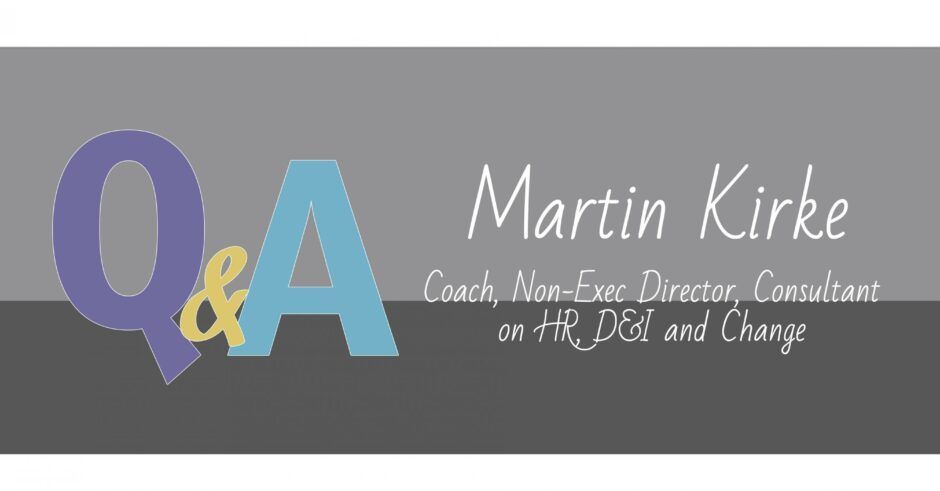We conducted a Q&A interview with Martin Kirke, Coach, Non-Exec Director, Consultant on HR, D&I and Change, around leaders, and how they can create a culture of inclusion.
From your experience, what are the attributes required from our leaders to gain their commitment to engaging our community and driving forward the diversity agenda?
Authenticity is by far the most important. There’s a huge amount of tokenism around Diversity & Inclusion. It’s one thing putting sandwiches in rainbow coloured boxes or painting railway carriages but what is the employee experience of the day to day behaviour of their leaders ? Too many leaders are still more comfortable working with people with similar backgrounds and experience to their own. We need leaders to want diversity in their teams because they value difference. It is precisely that difference which leads to better decision making and boosts business results.
They also need to be open and willing to take risks by sharing their own lived experience. I have seen rapid progress in organisations where for example a leader has told employees about their own experience of mental health problems which encouraged others to be more open as ask for help.
What initiatives have you seen work to create a truly inclusive culture?
I am the lead non-exec for D&I in an NHS Trust and we wanted to improve career progression for BAME employees. Our selection panels were already diverse on gender but there were too few leaders who were BAME to do the same on ethnicity. We decided to train BAME employees on interviewing and selection then mandated that all panels must be diverse. Panels now include at least one BAME employee and we are already seeing results.
It’s these sort of practical and tangible actions which produce results. Contrast it with a recent example I saw at a leading Financial Services company in the City. There was a large piece of paper stuck to the wall with the headline “ Bring your whole self to work “. Employees were asked to sign to show their agreement. Firstly it’s a meaningless statement which people can interpret in different ways. Secondly if an employee has a degree of prejudice against say LGBT what will they do ? Most likely they will avoid signing it or sign it and not change anything.
Can technology solve the workplace diversity and inclusion problem?
No, but it can be a valuable tool to support other initiatives. For example we no longer need to wait for the long slow process of getting employee engagement survey results. There are great apps which can be deployed quickly and cheaply to measure engagement including progress on D&I.
Simple but powerful questions on employees experience of diversity are still the best tool and better still if you then contrast e.g. BAME employee results with white employees. You can then track progress and also use the data for prediction. Why is this team lower on the D&I questions ? Is it a leadership problem ?
On inclusion there are also apps which help connect up the workforce for learning, problem solving and participation.
How can HR tackle the bias and ethics of HR Technology?
The HR profession has been slow to realise the enormous ethical challenges posed by AI and digital technology. Recently I had a demonstration of an on screen “bot” which interviews candidates. Now leaving aside the candidate experience- do I want to work for a company who can’t be bothered get some one to interview me ? – the supplier also claims it analyses facial expressions and gestures as part of the selection decision. So what about cultural and ethnic differences ? How is that compatible with improving D&I ?
I also attended a “ Wellness “ conference and it was full of suppliers selling fitness apps. Apparently employees are given wearable devices which report back to HR on the amount they exercise, their performance in the gym and produce league tables of employees competing to be top. All the promotional photos were of young employees exercising- no one older, no one with a visible disability. Not exactly promoting an inclusive culture and grossly intrusive.
These products are being bought and sometimes developed by HR and it is an urgent issue for HR leaders and our professional associations to produce advice, guidance and recommend if we need regulation.
Any product recommendations that you’ve seen align HR technology, diversity and ethics?
Yes, on the positive side there’s PushFar a company promoting mentoring and matching mentors with mentees. It can be used across organisations but is particularly effective for supporting employee networks such as LGBT, Disability, BAME etc. I was so impressed agree to become Chairman of its Advisory Board !
I have also had a demonstration of Spot which is a “ bot “ using AI to help employees report bullying and harassment. I was sceptical at first but there is evidence that when a distressing incident has happened people would rather report it to a machine than a person. It guides you through reporting what happened responding to your answers with different questions. I always found that whistleblowing lines are not effective and employees are reluctant to use them so perhaps this will be better.
It’s an exciting time with companies like these being set up by entrepreneurs and funded through crowdfunding or private equity so there’s plenty to be optimistic about.
This interview is exclusive to The Business Transformation Network.





